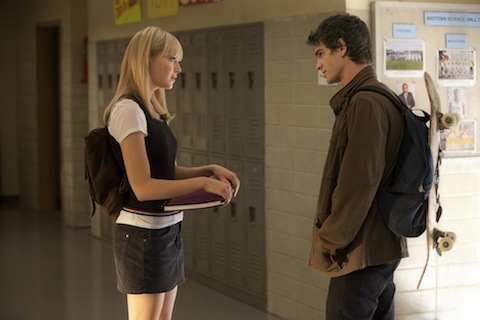And it does, once again, here.
Archive | July, 2012
Spied Her Man
I went into the new Spider-man movie with some misgivings, since the reviews I’d seen had been mostly tepid, ranking it below S1 and S2 and just barely above S3. But it’s turned out to be my favourite of the four films.

It’s not without its problems. There’s some clunky wince-inducing dialogue, the Lizard isn’t as compelling a villain as Dr. Octopus was in S2, Captain Stacy’s characterisation is inconsistent (does he seem like the kind of guy who would be neither displeased at finding a boy in his daughter’s room nor suspicious as to how he got in without passing through the rest of the apartment?), and it’s unclear why Parker can hear a bug crawling on the other side of the room but not an enormous humanoid lizard pouncing at him from behind. Plus they still haven’t figured out how to make Aunt May un-boring (but then nobody has really figured that out other than Straczynski during his run on the comic).
But the two leads (both as actors and as characters) are terrific and engaging (and their chemistry more believable than was the case with Maguire and Dunst), the origin story is more interesting (and actually tries hard to make more sense), Spider-man is finally the mouthy smartass he’s supposed to be (while at the same time being more spidery – the scene where he’s literally using a web the way spiders use it is terrific), Parker is smarter and less dorky, Gwen Stacy is far more resourceful than she ever was in the comics, and the film’s energy level is infectious (I was worried about how sleepy I was already feeling during the trailers, but the film quickly woke me up).
And Stan Lee’s cameo is his greatest ever.
Some have complained that in this version Parker has the wrong motivation for becoming Spider-man; but his motivations evolve over the course of the film. (I’m being vague to avoid spoilage.)
I saw it in 3D, just because that’s the version that was available at the time I went, but apart from a couple of scenes I don’t think it’s necessary.

I noticed that some footage included in the various trailers and previews was missing from the film – most notably the scene revealing why Parker prefers the fire escape to the elevator (namely because the security guard in the Stacys’ building insists on looking through visitors’ bags before passing anyone through, and Parker doesn’t want the guard seeing his Spider-togs), and the scene where Parker says football is too dangerous.
A piece of good news: although the film rights to Spider-man are controlled by Sony rather than Marvel, which technically rules out Spider-man’s appearance in the Avengers-line of movies, there’s been increased talk about the possibility of that prohibition’s being relaxed. (If this film and The Avengers do turn out to share a continuity, I’ll bet that this film comes diegetically first. Captain Stacy doesn’t seem as though he’s recently seen an alien army trashing New York.)
Cordial and Sanguine, Part 36: Wedding Bells Are Joining Up That Old Gang of Mine
My review for Reason.com of Elizabeth Brake’s Minimizing Marriage: Marriage, Morality, and the Law is now online.
I’ve also blogged thereon at BHL.
But what I really want to know is: can I marry a corporation?
With This Axe I Edit
As I’m planning to assign Robert E. Howard’s 1928 Kull story “By This Axe I Rule!” for my philosophy of law class in the fall (yes, really), I was comparing the version in my Kull anthology with one I found online. The former is obviously Howard’s original version or close to it, while the latter (scanning errors apart) has clearly undergone well-meaning editing, slight but pervasive, to tame some of Howard’s eccentricities of punctuation and usage.

Axe of the Apostles
While many of the revisions are improvements (including a catch of Howard’s losing track of how many assassins were supposed to be at the door, and of the direction in which Ka-nu’s Pictish escort was heading), on the whole it seems to me that the unknown editor had a tin ear for Howard’s language, and the comparison has given me new respect for Howard’s craft as a writer.
Two constructions in particular seem to have attracted the editor’s disfavour – what I’ll call the fast transition (“X happened and then Y happened”) and the slow transition (“X happened. And then Y happened”). In nearly all cases, both kinds of transition get changed to the more grammatically conventional “X happened, and then Y happened” – which I’ll call the medium-speed transition.
But although some of Howard’s punctuational choices admittedly seem a bit random, I don’t think there was anything random in his deployment of fast and slow transitions. (In this story, at least. I haven’t looked through Howard’s other stories with an eye to fast and slow transitions; sufficit diei.) His general preference for fast transitions fits the fast pace of the story; it’s like a cinematic tracking shot. But when he switches to a slow transition there’s a good reason for it. A good example is when Kull tells Seno val Dor: “I am sorry. But I cannot help you.” The editor changes this to “I am sorry, but I cannot help you,” but rushing through the apology like this makes Kull seem dismissive; Howard’s version, pausing on the “I am sorry,” gives it the weight of sincerity. (I would go back and find more of the examples I noticed, but I am too lazy.)
One reason I think Howard’s preference for fast and slow transitions over medium-speed ones was intentional is that he symbolically incorporates it into his description of Kull:
There was nothing deliberate or measured about his motions – either he was perfectly at rest – still as a bronze statue, or else he was in motion, with that catlike quickness which blurred the sight that tried to follow his movements.
Or again:
Ascalante leaped as a wolf leaps – halted almost in mid-air with the unbelievable speed which characterized him ….
(In that last one it’s almost as though Howard is foreseeing bullet time.)
Nitpick of the Day

Write this stuff, I do not. Read it only, I do. Off my case, you should get.
“Our own counsel we will keep on who is ready,” says Yoda in The Phantom Menace.
I don’t think George Lucas knows what “keeping one’s own counsel” means. It doesn’t mean “deciding for oneself without taking advice from others.” It means “keeping one’s own plans and opinions secret.” It’s a ban, so to speak, on the exportation of counsel, not on its importation.
There are people who will, y’know, read scripts to catch things like that. But Lucas’s own ban on importation of counsel is far too firmly in place. (A more substantive example: in the original Star Wars, when Luke finds the charred corpses of his aunt and uncle, Lucas wanted Hamill to shake his fist at the sky and shout “Nooooo!” but Hamill convinced him otherwise. Back then Lucas was more open to taking advice generally (from Spielberg and Coppola, for example). Obviously no one was in a position to argue Lucas down from having Vader shout “Nooooo!” at the end of Revenge of the Sith.)
Tertium Datur
So what moral defect and/or lack of political imagination do these two songs (or the imagined narrators thereof) have in common?
The nations not so blest as thee
must in their turns to tyrants fall
while thou shalt flourish great and free,
the dread and envy of them all:
Rule, Britannia! Britannia rule the waves:
Britons never, never, never shall be slaves.
So I’m picking ’em up and I’m laying ’em down
I believe he’s going to work me into the ground
I pull to the left, I heave to the right
I ought to kill him but it wouldn’t be right
’cause I’m working for the man
I’m working for the man ….
So I slave all day without much pay
’cause I’m just biding my time
’cause the company and the daughter you see
they’re both going to be all mine
yeah, I’m going to be the man
I’m going to be the man ….
